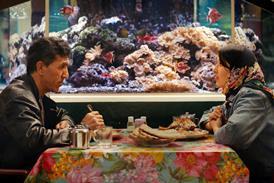Dir: Pupi Avati. Italy. 2003. 107mins.
The Heart Elsewhere (Il Cuore Altrove), Pupi Avati's sentimental period drama set in 1920s Bologna, has its good points, notably the emergence of Neri Marcore - so far known mainly for his appearances on Italian TV comedy shows - as a serious actor but it is flawed by a spectacularly wooden performance by Marcore's love interest, Vanessa Incontrada. The main effect of the film's Cannes airing, beyond adding a few more territorial sales, will be to give it new life on the home front, where it has so far taken a respectable $1.7m after opening in late January on 131 screens.
It has been a good few months for Avati: first, at the end of 2002, he became director of Cinecitta Holding; then, just last week, his latest film - which emerged in Italy earlier this year, to mixed reviews - was selected for the Cannes official competition. But the selection says little either for the state of Italian cinema or for the quality of this years' Cannes roster.
Avati is rapidly becoming the Merchant-Ivory of the Italian provinces. The Heart Elsewhere turns the same soft-edged, nostalgic cinematic gaze on the director's Emilia Romagna homelands as Una Gita Scolastica (1983) or Il Testimone Dello Sposo (1994). It centres on Nello, an awkward and immature 35-year-old who is sent to Bologna by his Roman family, ostensibly to work as a schoolteacher, but in reality in the hope that he will find himself a wife. After a couple of false starts, Nello comes up with a candidate: a girl called Angela, scion of one of Bologna's leading families, who has been suddenly struck blind by a cruel plot.
Nello, of course, is the blind one in the affair: wilfully oblivious to Angela's manipulative man-eating ways, and immersed in the amorous posturings of his beloved Latin and Greek classics, he dreams himself into a love that has little to do with the unworthy object, who looks like Julia Roberts with freckles on a bad hair day.
A solid scriptwriter, Avati likes to work on a big canvas, with a Dickensian proliferation of minor characters and caricatures. Comic relief is offered by Nello's boarding house roommate Domenico, a Neapolitan barber played with rascally verve by romantic crooner Nino D'Angelo; and by Nello's Roman family, tailors to the Vatican, led by Giannini who plays up the salt-of-the-earth Roman character (and accent) for all it is worth.
Part of the pleasure of a film like this comes from its good-natured wallow in the swamp of nostalgia, which is backed up by Riz Ortolani's surging, Mahler-esque soundtrack. But it all comes unstuck with the entrance of Angela (Incontrada, an actress who in a previous life was the face and legs of a leading Italian mobile phone company) who seems to have stepped out of a much later era, more flower child than flapper. From here on in the audience's indulgence at the film's weaknesses (its excessive reliance on cliche, its cardboard Dead Poets Society schoolroom subplot) turns to irritation; and by the end, Marcore's character, whose soft-spoken courtesy makes his gradual degradation and unravelling potentially fascinating, has lost much of its intensity.
Prod co: DueA Film
Int'l sales: Rai Trade
It dist: 01 Dist
Prod: Antonio Avati
Scr: Pupi Avati
Cinematography: Pasquale Rachini
Prod des: Simona Migliotti
Ed: Amedeo Salfa
Music: Riz Ortolani
Main cast: Neri Marcore, Vanessa Incontrada, Giancarlo Giannini, Nino D'Angelo



















No comments yet